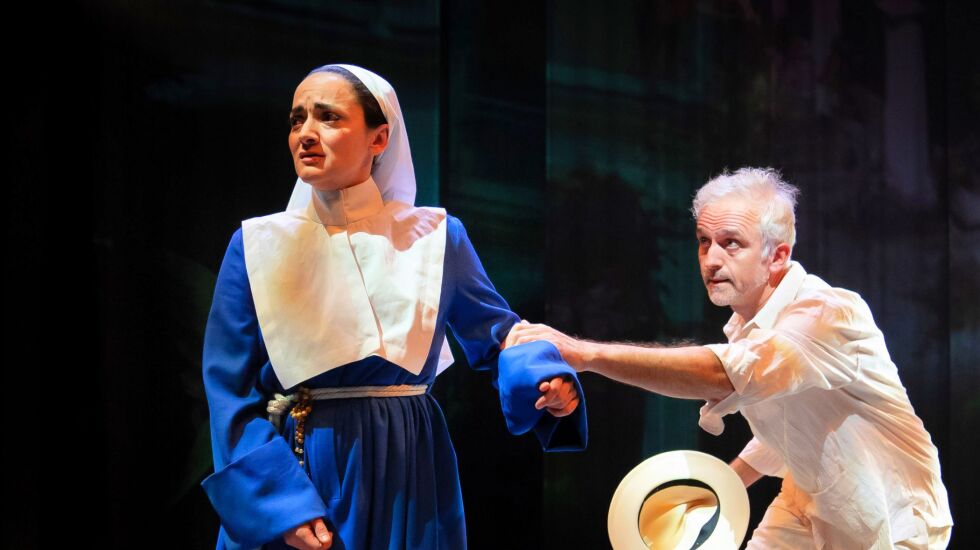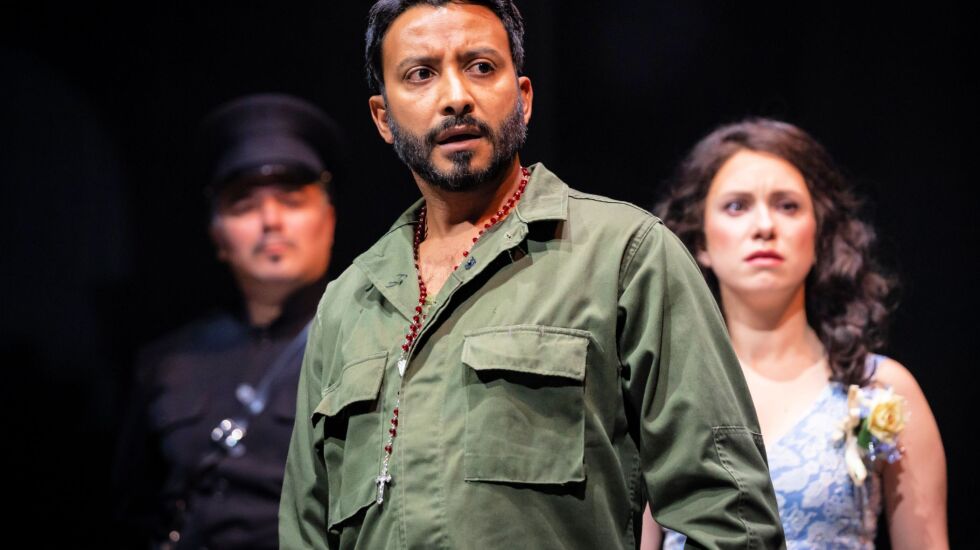
At lights up in Chicago Shakespeare Theater’s immersive, vibrant “Measure for Measure,” we’re in a raucous, glamorously seedy Havana nightclub. The place is La Trucha, a tropical stand-in for the Vienna, Italy, bawdy house that plays a crucial role in Shakespeare’s drama about sexual coercion, hypocrisy and tyranny. The time is 1952, the year Fidel Castro would come to power on the island nation roughly 90 miles southwest of the tip of Florida.
In moving the so-called “problem play” from Italy to Cuba, director Henry Godinez highlights its troubling power. Arrive early: He sets the stage before the 100-minute, intermission-less show proper starts with a 10-minute pre-show floor show.
Here, Mistress Overdone (Ana Santos) the bawdy house’s resident mother-to-all shimmies about the club in a shimmering crimson gown, enticing the audience to join in a salsa or a mambo alongside a bevy of dancing girls clad in undulating sequins and feathers.
The club also offers a spotlight for Claudio (Andres Enriquez), a dashing velvet-voiced charmer in an immaculate white tuxedo. La Trucha is a place of many moods, and Godinez switches the ambiance to slow-dance torrid romance when Espurna (Kidany Camilo) takes the mic for a melancholic, mesmerizing ballad.
The mood is unabashedly decadent. Amid the singing and dancing, dipsomaniacal local constable Elbow (Joe Foust) stumbles between cocktail tables wearing a huge hat and a tiny pair of briefs. In-house “bawd” Pompey (Elizabeth Ledo) charms the clients and does what’s needed to keep the party going.
It’s all gowns and glamor and louche and light until a brutal crackdown by military man Angelo (Adam Poss), newly empowered by an inept Duke (Kevin Gudahl) to sweep the city of vice. Angelo is as merciless as he is puritanical. Pompey, Espurna and Mistress Overdone are stripped of their finery and forced into prison uniforms designed to rob them of their very identities. The plot kicks into gear when Claudio is sentenced to death for having sex with his fiance Julietta (Felicia Oduh), who is heavily pregnant with his child when she is also imprisoned.
Claudio’s only hope of a pardon comes in the form of his sister Isabel (Cruz Gonzalez-Cadel), a novitiate in a cloister where the nuns all are forbidden to so much as look at a man once they’ve taken their vows. Isabel pleads for Angelo to spare her brother’s life and, miraculously it initially seems, Angelo agrees. Then he states the price: Isabel’s virginity. She’s not willing to pay. Gonzalez-Cruz captures both the piety and the extremity of Isabella’s own morality: he’d lay down her life for her brother, Isabel says in one of Shakespeare’s most complicated takes on passion and principle, but she won’t lose her virginity to save him.
“Measure for Measure” is technically a comedy, since it ends with marriage and not in death. But make no mistake: Isabel’s mood is grim in the end, and for good reason. As for the double marriage that brings “Measure for Measure” to a close, the future looks as dour as it does rosy.
As Angelo, Poss steps into the power of the absent duke gingerly, but once there, he’s chilling as the draconian head of the de facto morality police. Gonzalez-Cadel’s Isabel moves from innocence to despair to righteousness with tireless intensity. Her scenes with Angelo feature some of the most unnervingly realistic fight choreography (by Maya Vince Prentiss) I’ve seen in years.

As Angelo’s Provost, Robert Schleifer captures the deeply troubled conscience of someone tasked with enforcing unjust laws. Schleifer is deaf and signs the role; even were his words not verbally translated by various characters in Godinez’s seamless adaptation, you’d know exactly what he was saying. Composer/music director Orbert Davis and co-arranger/composer Jorge Amado Molina make the songs of La Trucha pop, whether they’re party-time salsas or soaring ballads.
Rasean Davonte Johnson’s scenic and projection design has images of 1950s Cuba flickering over scrims that evoke the linen suits and fedoras sported by the characters. “Measure for Measure” at full text takes about three hours to play out. Godinez has shaved it down to its essence and made its Cuban setting both immensely vivid, specific and universal.







